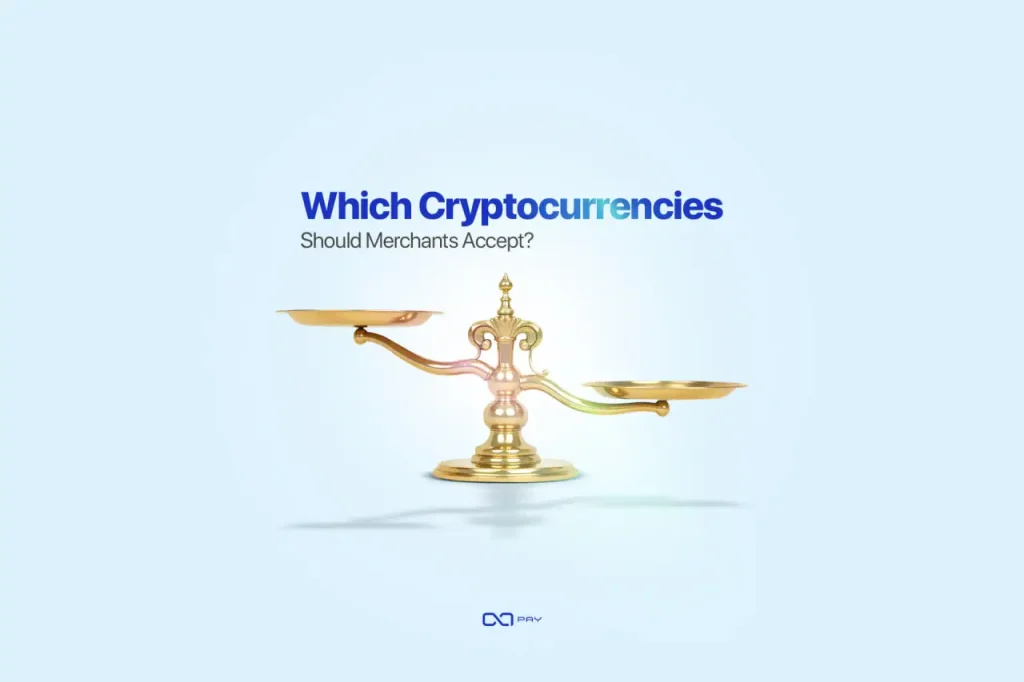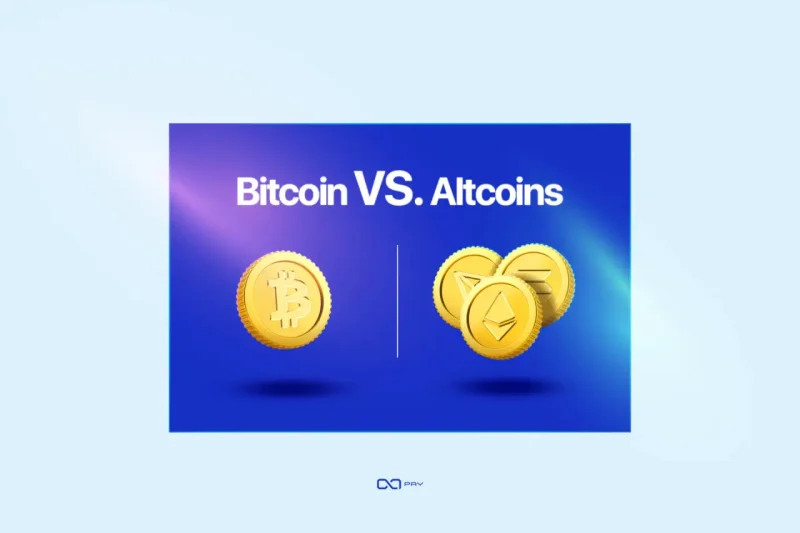Cryptocurrencies have become a viable payment method for businesses worldwide. Bitcoin, as the first and most widely recognized cryptocurrency, has been the preferred choice for many merchants. However, while Bitcoin remains a strong choice, altcoins for payments offer potential advantages, such as faster transactions, lower fees, and enhanced scalability.
This article offers a detailed comparison of Bitcoin and altcoins for payments, helping merchants make informed decisions based on key factors like speed, fees, security, and market adoption.
Understanding Bitcoin and Altcoins
Bitcoin: The First and Most Renowned Crypto
Bitcoin (BTC) was introduced in 2009 and remains the most well-known and widely accepted cryptocurrency. It is often regarded as a digital store of value, but its transaction fees and processing times can pose challenges for everyday payments.
Advantages:
- High market recognition and trust
- Secure and decentralized
- Widely accepted among crypto users
Disadvantages:
- High transaction fees
- Slower transaction times compared to altcoins
- Scalability challenges
Altcoins: Diverse Alternative Cryptocurrencies
Altcoins refer to all cryptocurrencies other than Bitcoin. Popular altcoins such as Ethereum (ETH),Tether (USDT), Litecoin (LTC), Solana (SOL), Tron (TRX), and Monero (XMR) have been developed to address Bitcoin’s limitations. Some altcoins focus on speed and efficiency, while others, like stablecoins (e.g., USDT, USDC), offer price stability by being pegged to fiat currencies.
Advantages:
- Faster and cheaper transactions
- Greater scalability solutions
- Various features tailored for specific use cases (e.g., privacy, stable value, smart contracts)
Disadvantages:
- Less market recognition compared to Bitcoin
- Some altcoins may have lower security and adoption
Key Factors for Merchants to Consider
Merchants evaluating cryptocurrency payment options should consider the following factors:
1. Transaction Speed
| Cryptocurrency | Average Transaction Time |
| Bitcoin (BTC) | 10–60 minutes |
| Ethereum (ETH) | 15 seconds – 5 minutes |
| Tether (USDT) (TRC-20/BEP-20) | Instant – Few seconds |
| Litecoin (LTC) | 2.5 minutes |
| Solana (SOL) | Milliseconds – 2 seconds |
| Tron (TRX) | Instant – Few seconds |
Bitcoin transactions can be delayed due to network congestion, whereas altcoins like Tron (TRX), Solana (SOL), and stablecoins (USDT on TRC-20/BEP-20) offer near-instant payments, making them more suitable for businesses requiring fast transactions.
2. Transaction Fees
| Cryptocurrency | Average Transaction Fee |
| Bitcoin (BTC) | $5 – $30+ (depending on network congestion) |
| Ethereum (ETH) | $2 – $100+ (varies based on demand) |
| Tether (USDT) (TRC-20) | Less than $1 |
| Litecoin (LTC) | Less than $0.10 |
| Solana (SOL) | Less than $0.001 |
| Tron (TRX) | Less than $0.01 |
When considering Bitcoin vs. Altcoins for Payments, transaction fees are a key factor, as Bitcoin and Ethereum can become costly during high network activity. In contrast, altcoins such as Litecoin (LTC), Tron (TRX), and Solana (SOL) offer significantly lower transaction fees, making them more cost-effective for businesses.
3. Volatility: Bitcoin vs. Stablecoins
Price volatility is a significant concern for merchants. Bitcoin and most altcoins fluctuate in value, which can lead to financial uncertainty between the time of payment and conversion to fiat currency.
- Bitcoin (BTC) and other altcoins: Prone to significant price swings, which can impact revenue stability.
- Stablecoins (USDT, USDC): Pegged to the US dollar, providing a reliable alternative without price fluctuations.
Merchants seeking price stability should consider accepting stablecoins like USDT or USDC alongside Bitcoin.
How Accepting Stablecoins Can Help Businesses Manage Volatility
4. Security and Compliance
| Factor | Bitcoin | Altcoins |
| Security | Highly secure, but slow | Varies based on network |
| Regulatory Compliance | Recognized globally | Some altcoins face regulatory challenges |
| Privacy | Transparent ledger | Some altcoins (e.g., Monero) offer anonymity |
Bitcoin is the most secure cryptocurrency due to its network size and widespread adoption. However, privacy-focused altcoins like Monero (XMR) provide anonymity, which may be important for some businesses and customers.
5. Adoption and Customer Preference
| Cryptocurrency | Adoption Level |
| Bitcoin (BTC) | Highest adoption |
| Ethereum (ETH) | Very high adoption |
| Tether (USDT) | Widely used, especially in stable transactions |
| Litecoin (LTC) | Moderate adoption |
| Tron (TRX) | Growing adoption |
| Monero (XMR) | Preferred for privacy-focused transactions |
While Bitcoin enjoys the highest level of adoption, stablecoins and efficient altcoins like Litecoin (LTC) and Tron (TRX) are gaining popularity due to their practical advantages.
Bitcoin vs. Litecoin: Choosing the Right Solution for Payment
6. Scalability
Scalability is a crucial aspect of cryptocurrency payments, particularly for businesses handling high transaction volumes. Bitcoin has inherent scalability limitations due to its block size and Proof-of-Work mechanism. In contrast, Ethereum (with Layer 2 solutions), Solana, and Tron provide greater scalability, enabling thousands of transactions per second.
| Cryptocurrency | Scalability (Transactions per Second) |
| Bitcoin (BTC) | ~7 TPS |
| Ethereum (ETH) | ~30 TPS (Layer 1), ~1,000+ TPS (Layer 2) |
| Solana (SOL) | ~65,000 TPS |
| Tron (TRX) | ~2,000 TPS |
| Litecoin (LTC) | ~56 TPS |
This makes Solana and Tron more suitable for businesses needing high-speed processing with minimal delays.
7. Decentralization
Decentralization ensures that no single entity controls a cryptocurrency network. Bitcoin remains one of the most decentralized networks due to its vast mining ecosystem. However, some altcoins prioritize efficiency over decentralization.
| Cryptocurrency | Level of Decentralization |
| Bitcoin (BTC) | Highly decentralized |
| Ethereum (ETH) | Moderately decentralized (Moving to PoS) |
| Solana (SOL) | Less decentralized due to validator concentration |
| Tron (TRX) | Centralized governance compared to Bitcoin |
| Litecoin (LTC) | Similar to Bitcoin but with fewer miners |
Solana and Tron offer high transaction speeds but rely on a smaller number of validators, reducing their decentralization compared to Bitcoin and Ethereum.
8. Large Merchants and Payments: Bitcoin vs. Altcoins
Bitcoin is widely accepted by major companies such as Tesla, Microsoft, and Shopify, which recognize its value as a payment method. However, stablecoins like USDT and USDC are also gaining traction among merchants seeking price stability. Additionally, altcoins such as Ethereum and Litecoin have seen growing adoption for payment services, especially in e-commerce and digital platforms.
9. Development and Innovation
The cryptocurrency ecosystem is constantly evolving, with some blockchains prioritizing development and innovation more than others. Ethereum leads in smart contract development and decentralized applications (DeFi and NFTs), while Solana and Tron focus on high-speed transactions for everyday payments. Bitcoin, on the other hand, is more conservative in terms of upgrades, primarily serving as a store of value.
10. Legal and Tax Issues
Merchants must consider legal and tax implications when accepting cryptocurrency payments. Bitcoin is legally recognized in many countries, with clear tax regulations in place. However, stablecoins and privacy coins (e.g., Monero) may face stricter regulations due to concerns over financial compliance and anti-money laundering (AML) laws. Businesses must ensure compliance with local regulations when integrating crypto payments.

Which Cryptocurrencies Should Merchants Accept?
Accept Bitcoin for:
- Brand recognition and trust
- Large transactions
- Customers who prefer Bitcoin as a long-term investment asset
Accept Altcoins for:
- Faster transactions and lower fees (e.g., Tron, Solana, Litecoin)
- Price stability without volatility (e.g., USDT, USDC)
- Enhanced privacy (e.g., Monero)
Best Approach: Accept Both Bitcoin & Altcoins
A well-rounded crypto payment strategy should incorporate both Bitcoin and select altcoins to maximize customer reach and operational efficiency. OxaPay Payment gateway enable businesses to accept multiple cryptocurrencies while offering automatic conversions to mitigate volatility risks.
OxaPay: A Comprehensive Crypto Payment Solution
For businesses looking to seamlessly integrate cryptocurrency payments, OxaPay offers a reliable, secure, and scalable solution. Supporting both Bitcoin and a wide range of altcoins, OxaPay enables merchants to process transactions quickly and cost-effectively.
Key Features for Merchants:
Multi-Currency Support
Accept Bitcoinand altcoins such as Ethereum, USDT, Tron, Solana, Litecoin, Monero, and many more, allowing businesses to expand payment options and attract global customers.
Easy Integration & Advanced Services
OxaPay offers seamless integration through payment plugins for WooCommerce, WHMCS, PrestaShop, Blesta, and more. Additionally, it offers comprehensive crypto payment APIs, including Invoice Services, White Label, Static Wallets, and Automated Payouts, allowing businesses to streamline and automate crypto payments efficiently.
Security & Scalability
Ensures robust security and reliable transactions while OxaPay’s highly scalable infrastructure efficiently supports businesses of all sizes.
Advanced Payment Management Tools
Get access to detailed transaction reports, automated conversions, customizable payment settings, webhooks, automatic withdrawals, and many more features, simplifying crypto payment management..
Low Transaction Fees
Competitive, transparent pricing ensures merchants save on payment processing costs.
OxaPay enables merchants to seamlessly integrate crypto payments, providing a reliable, scalable, and efficient solution to stay competitive in the evolving digital economy. Solutions for Accepting Crypto Payments with OxaPay ensure businesses have access to secure and flexible payment options.
Conclusion
Choosing the right cryptocurrency for payments is essential for businesses looking to optimize transactions and reduce costs. While Bitcoin offers strong recognition, altcoins provide faster and more cost-effective payments, ensuring greater adaptability and security. OxaPay enables merchants to seamlessly integrate crypto payments, offering a reliable, scalable, and efficient solution to stay competitive in the evolving digital economy.




